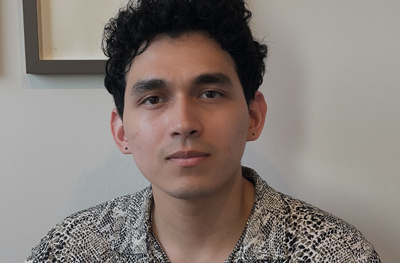
Sam Preza, a doctoral student in Bioengineering, was named one of two Penn graduate students and one of 50 graduate students nationwide to receive a 2024 Howard Hughes Medical Institute (HHMI) Gilliam Fellowship. The HHMI Gilliam Fellowship cohort is awarded annually to graduate students and their advisors for outstanding research and commitment to advancing equity and inclusion in science. The fellowship includes a one-year mentorship skills development course and support to promote healthy and inclusive graduate training environments at their home institution.
Preza is a member of lab of Juan Rene Alvarez Dominguez, Assistant Professor of Cell and Developmental Biology in the Perelman School of Medicine and member of the Bioengineering Graduate Group. He graduated from University of Maryland in 2019 with a degree in Chemical Engineering. After working for t three years at AstraZeneca in Bioprocess Development, he joined the J-RAD Lab where he researches technologies for unmet medical needs:
“[Preza’s] PhD program harnesses the power of stem cells and circadian rhythms to ultimately develop a cure for Type I diabetes, which he researches alongside his advisor, Juan Alvarez, PhD, an assistant professor in the Department of Cell and Developmental Biology. Their studies focus on beta cells, the type of cell found in the pancreas that helps regulate glucose. In the lab, they study how exposing cells to circadian rhythms could lead to functional beta cells that can be transplanted into diabetic patients to restore function. This work will be supported by their HHMI Fellowship grant.
The fellowship not only supports their scientific research but also helps foster an inclusive research environment, ensuring various backgrounds and ideologies contribute to their research. Preza is starting a DEI ‘potluck’, where bioengineering students can gather to discuss new research or career ideas. The meetups are catered by whichever student is hosting the meeting and can either showcase their nationality’s food or a cuisine they are passionate about, highlighting the celebration of diversity of ideas through food.
‘I believe STEM fields should look more like a mosaic of all our backgrounds rather than a melting pot, to add to the richness that is the art of science,’ Preza said.”
Read “Inclusion meets innovation: Meet Penn’s new Gilliam Fellows” in Penn Medicine News.
